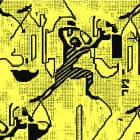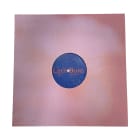
- Label
- Pacific Rhythm
- Catalogue
- PR008
- Eancode
- No eancode
- Format
- LP
- Release Date
- Unknown
- Stock
- Out of stock
Unknown Mobile
Daucile Moon
- 1 Medicine Man
- 2 Ravers Sojourn
- 3 A Windless March Ouest (feat CFCF)
- 4 Simone Can't Swim
- 6 Oenology (feat CFCF)
- 7 Looping Truths & Expectations
Daucile Moon, which follows Unknown Mobile releases on No Bad Days, Normals Welcome and Young Adults, started four years ago in Vancouver when Levi Bruce was recovering from a broken toe and collecting MIDI files he found in an old geocities archive. It was finished earlier this year in Montreal with help from Mike Silver, AKA CFCF, who added plaintive guitar to complete the album's placid and stargazing style of ambient and downtempo music. The album takes its name from an old, obscure Canadian jazz song that Bruce describes as ''pretty but also with a serious amount of melancholy,'' which could also describe his new record. In the vein of Pacific Rhythm label-mate Khotin's standout New Tab album, Daucile Moon comprises drowsy beats and spaced-out loops, referencing the pinnacle of early '90s chillout and ambient while infusing it with the dazed sound of Canadian electronic music in the 2010s. Bruce's process in making Daucile Moon was long but leisurely. He took the melodies from those MIDI files and moved them over to his analogue outboard setup and then back to his computer, creating a digital-analog hybrid that sounds as pleasantly worn as a dog-eared novel. Live instrumentation, like Silver's classical acoustic guitar stylings on ''A Windless March Ouest,'' mingles with occasional dance music references like the subtle acid squelch of ''Ravers Sojourn'' or the hazy breakbeat of ''Oenology.'' The album was inspired by various happy memories, from sharing wine with friends (''Oenology'') to a dog that Bruce met (''Simone Can't Swim''). The result is a patient and personal record that highlights the best qualities of Bruce's previous work as Unknown Mobile, with his distinct style of melody and soundscaping set free from kick drums and the dance floor. It's telling that Bruce originally sent the record, at first called Melancholic Songs For Dogs, to his parents and two grandmas—this is beautiful, relaxing music whose appeal is universal.

